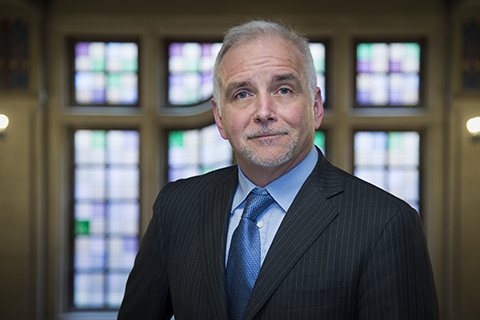April 20, 2016
Murphy Award: Keith Shimko
 |
|
Keith Shimko, associate professor of political science. (Purdue University photo/Mark Simons) |
Five teachers have received the 2016 Outstanding Undergraduate Teaching Award in Memory of Charles B. Murphy. This week, Purdue Today will feature Q&A's on each of the recipients. This Q&A focuses on Keith Shimko, associate professor of political science.
Years at Purdue: 27.
Teaching interests: I teach in the general areas of international relations, international security and military affairs. My favorite undergraduate class is POL 237: Modern Weapons and International Relations, which examines the relationship between technological change and the evolution of warfare since the development of gunpowder weapons in the 14th century all the way up to the Iraq wars.
What he wants students to gain from his lectures: Questions. I want students to leave class thinking, either about something they have not thought about before, or thinking in new ways about things they have thought about. I always want them to feel that there is so much more to learn. I still remember a student evaluation from my first semester at Purdue. Though the student liked the class, they found it a bit “frustrating” because it “did not really provide any answers.” Initially I found this odd. I thought I had given a lot of answers. I looked over my lectures and there were answers all over the place. Eventually I realized that the frustration came not from the lack of answers, but rather their proliferation. That is, for every question I gave multiple potential answers. So, while it might seem odd, I want students who come to my classes looking for “the answer” to leave a little frustrated.
On what makes an engaging lecture: Most of my classes are quite large. I think I have taught maybe four or five undergraduate classes with less than 150 students since Bill Clinton was in the White House. As a result, the vast majority of my classes are lectures, so I have given a lot of thought to what makes for a great lecture. There are, of course, the basics of style and delivery. Enthusiasm is essential -- you cannot expect students be interested if you do not appear to be. Though I sometimes hear dismissive references to good lecturers as “sages of the stage,” there is no escaping the reality that good lecture has a performance element to it. But I think that, most importantly, a lecture has to fit together and tell a coherent story. It should not be just a collection of points, names, dates and facts. Everything in the lecture should be connected, answering a central question or exploring some basic puzzle or paradox.
How important it is to remain unbiased: I think this is absolutely critical, especially in classes about politics where students often enter expecting to be confronted with some sort of political/ideological bias. I always challenge myself, and my students, to understand and convey fairly points of view with which we disagree. I have, for example, taught smaller classes on the Iraq wars in which I ask students to write two essays, one making the best non-polemical case they can that the 2003 invasion of Iraq served the national interest and another arguing that it did not. I tell them I do not want to know what they personally think because I cannot put a grade on their political/strategic opinions and judgments. I can, however, grade how well they understand and articulate various points of view. I try my best to keep my own views to myself. I remember polling the class at the end of the semester as to what they thought my position was on the Iraq war. I was pleased that less than half guessed correctly. I told them that if they wanted to know they should come to my office after the semester was over and I would be happy to tell them.
Why he chooses to be a mentor: I enjoy it and find it fulfilling. When I was an undergraduate, I had two favorite professors, Stan Michalak and Glenn Miller, at Franklin and Marshall College. I took every class they offered and was always stopping by their offices or having coffee with them in the student center. In my junior year, they asked me what I planned to do after graduation. I told them what I told my parents -- I was going to law school. They both thought that would be a big mistake. But what else would I do with a political science degree? They suggested I go to graduate school and become a professor. There was, they told me, nothing better or more rewarding than spending one’s life teaching, interacting with and mentoring students. To extent that I had an “inspiration,” I suppose that was it. I will be forever grateful that they set me on the path that has led me to where I am today. I cannot imagine doing anything else.
What his students say: "As a senior, I am happy to say this has easily been one of my favorite classes during my time at Purdue. The content of the class is exceedingly interesting and is made more entertaining by the professor's sense of humor and gestures. My only regret in taking this course is that I found it in my last semester, and will not be able to take more course from Professor Shimko. "
"I thoroughly enjoyed attending this class every day. Professor Shimko is engaging and intelligent. Never did I feel bored, in fact, many times class seemed to go by so fast I did not believe the full 50 minutes had passed. He is a respectful professor, stayed away from political leanings very well, looking at both arguments in most conflicts."
On winning the Murphy Award: It is just nice to be recognized and rewarded for doing what I love, something I consider by far the most important part of what I do at Purdue.

